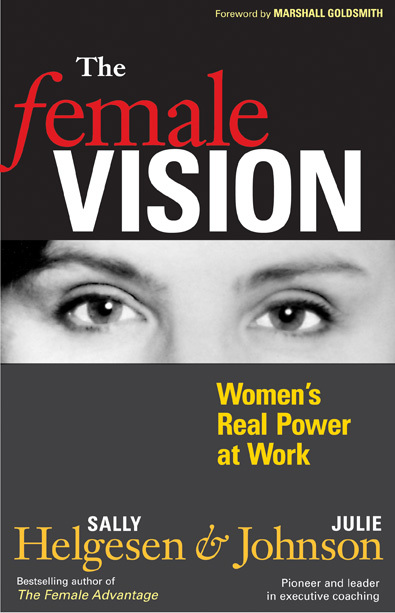
Fact: talented executive women in surprising numbers are continuing to leave executive jobs, even after making significant sacrifices to climb the ladder. More than the many who lost jobs during the Great Recession. Many leave to start new ventures, typically small businesses, and others just leave. There's a hauntingly similar refrain from many of them when asked about why they left: "It just wasn't worth it." Financial rewards and prestige didn't balance the often soulless work environment and the feelings of isolation and lack of emotional support experienced by many of these high achievers. A new book, The Female Vision: Women's Real Power at Work, co-authored by Julie Johnson, an executive coach, and Sally Helgesen, an author and consultant who often writes about women's issues, offers insights about what's going on and what we can do to stop the brain drain of talented women.
The reality regarding the low percentage of women who serve as CEOs, board directors and senior executives continues to be puzzling in view of the swell of female enrollment at business and law schools and other graduate programs. The old argument was that we needed to have "women in the pipeline" who would be logically promoted after paying their dues and competing for top jobs with their male colleagues. Well, we've had a critical mass of women at entry and middle management levels for at least two decades and we continue to see them leaving or not being selected for senior roles in spite of mentoring, coaching, the formation of networks, family-friendly policies and other measures designed to help. The authors worked closely with the National Council for Research on Women to conduct research to document these realities and come up with recommendations to right the balance.
Why should we care? When you get beyond the basic issue of fairness, the truth is that we need all the talent we can muster to solve the problems facing our society and the economy. Men rule the world, especially the business world, and things aren't going so well. Women bring an ability to see issues in a way that is different from how male colleagues see things. Johnson and Helgesen call this ability of women "broad-spectrum notice:"
Men and women often have different styles of noticing....researchers find that men tend to focus deeply and narrowly on a single perception or task, whereas women's attention is often simultaneously engaged by a number of things...Women are often first class noticers, accustomed to gleaning information from a wide range and variety of sources.
This issue of "noticing" is based on research regarding how brain chemistry works as well as how we are socialized. The bottom line is that women can tap into intuition and other qualitative factors that provide a broader look at dynamics in a work environment, interaction with colleagues and relationships with clients. Women have analytical skills and can do the quantitative analysis required, but typically notice issues that go beyond the numbers - issues in relationships, among other things. Women's observations are sometimes seen by male colleagues as irrelevant or "off point" - and many women have had the experience of having their contribution ignored in a meeting, only to have it applauded when a man repeats it. And it's that feeling of not having your opinions valued and feeling isolated that leads many women to throw in the corporate towel.
According to Helgesen and Johnson, women and men often experience the world differently--not only do they see things differently, but they also see different things. Men tend to be analytical and focused on the bottom line and achievement of results, with little attention paid to feelings and relationships in the workplace. Women place more value on interpersonal dynamics and have more awareness of how feelings and relationships impact an organization's ability to achieve results.
Both ways of seeing the world are important but what is rewarded today are male models of management: strong, focused on results, tough, and dominant. The prevalent models in business culture tend to be people like Jack Welch, who remains a hero to many. Empathy is still a dirty word in some quarters - it's seen as something for a "girlie man."
Helgesen and Johnson tell the story of several women who have navigated the rocky waters of the executive suite--not all have thrived. Enron whistle-blower Sherron Watkins tried to warn Ken Lay about the risks that ultimately brought down the firm. Johnna Torsone, Chief HR Officer at Pitney Bowes, braved the wrath of colleagues by speaking out against a rich stock option program proposal that ultimately would have led to short-term behavior that would destroy value. Susan Bernstein noticed behaviors in her consulting firm's clients that led her to raise a red flag but her insights were rejected by her boss, who told her to stay focused on strategy issues, not interpersonal conflict, in order to stay "objective." All had the managerial courage to speak up because of insights they had that were in some cases vastly different from those of colleagues. Some have prevailed and others have created new opportunities for themselves where they had better control over the work environment.
What would the world be like if a team working on a problem had access to well-rounded perspectives regarding the issues? That had qualitative as well as quantitative issues clearly defined? That had an execution strategy that reflected the emotional barriers to making it happen? That's the kind of world that many women--and men-- want to live in, and it would be a better world if we can make it work.
Disclosure: the writer used to work at Pitney Bowes.